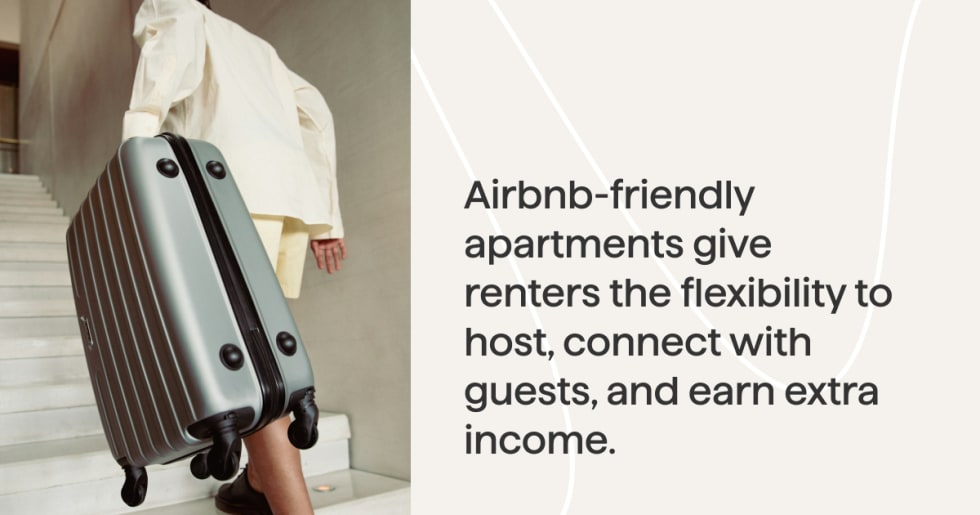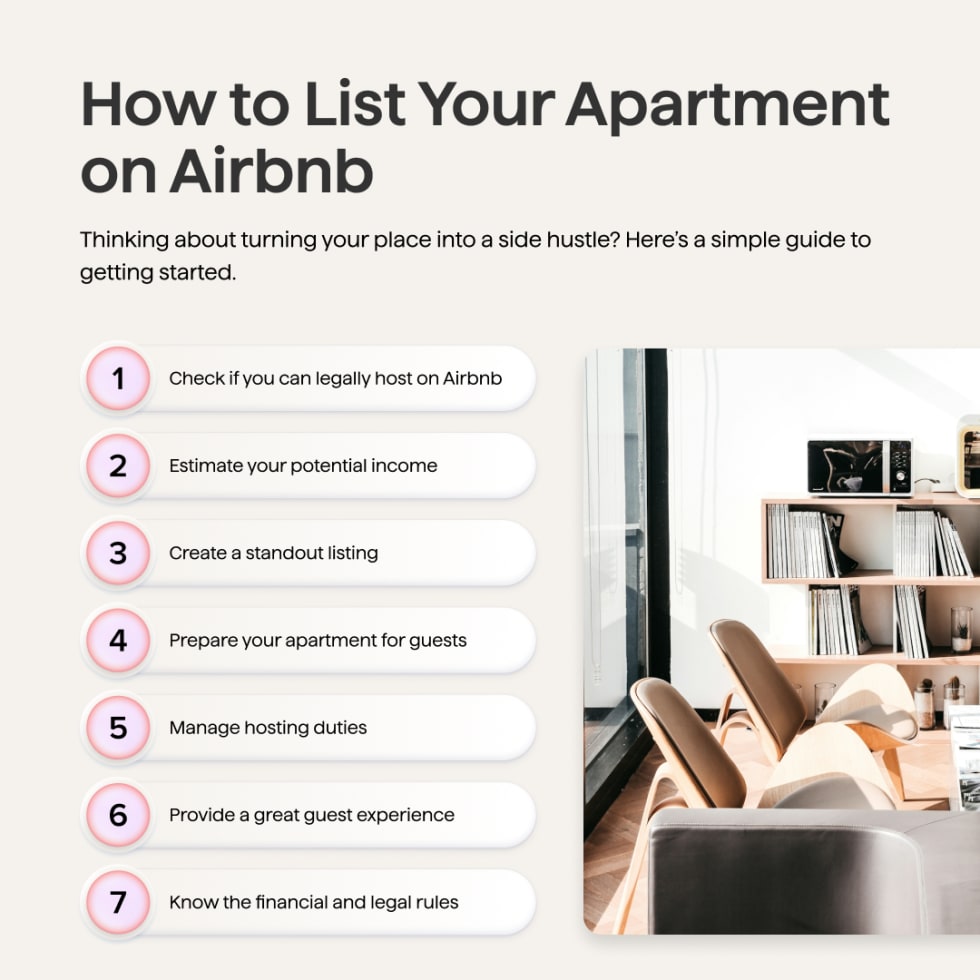- 47 units available
- 1 bed • 2 bed • 3 bed
- Amenities
In unit laundry, Hardwood floors, Dishwasher, 24hr maintenance, Stainless steel, Walk in closets + more

For renters, flexibility is more than a perk—it’s the main draw. You want a home that actually feels like yours, not one that limits how you live. Enter Airbnb-friendly apartments: places that let you host and earn extra income along the way.
Whether you want more flexibility in how you live, or want to find a home that works harder for you, an Airbnb-friendly apartment gives you the option to host your way without overstepping lease terms.
If you’re thinking about hosting on Airbnb, we’ll walk you through what Airbnb-friendly apartments are, how to find them, and how to host guests like a total pro.
Airbnb-friendly apartments give you the option to host guests for short-term stays while still living there. It opens the door to more freedom and flexibility in how you live, putting you in control of how you use your space.
Taking off for a trip? Rent out the whole apartment. Want to earn extra income without leaving home? Rent out a room. How and when you host is totally up to you.

Log into your Apartment List account and select the “Airbnb-friendly” filter below the Amenities menu. Eligible apartments will also have a dedicated Airbnb-friendly card, so you’ll see if hosting is an option before filling out an application.
Don’t have an Apartment List account yet? No sweat. While taking the Apartment List quiz, select the “Airbnb-friendly” filter under Amenities to match with apartments where hosting is an option.
Thinking about hosting? Here’s everything you need to know before getting your apartment guest-ready:
Even if your apartment is listed as ‘Airbnb-friendly,’ it’s best to review your lease agreement to see if short-term rentals are allowed. Some cities also have their own regulations—like limits on the number of nights you can rent out per year, or requirements to register as a host.
When in doubt, talk to your landlord or building manager. It’s easier to get all the details upfront than untangle issues later.
Hosting can be a great way to earn extra income while renting, but it helps to know what to expect before jumping in.
You can estimate your potential income with Airbnb’s earnings calculator—a quick search for your building name + Airbnb will usually get you to it—or check out similar Airbnb listings in your area for a ballpark nightly rate.
Keep in mind: your nightly rate doesn’t determine your total income. You’ll have to factor in costs like:
Crunching the numbers ahead of time will help you decide whether or not hosting fits your lifestyle.
A solid listing helps set you up for repeat bookings. Highlight your apartment’s best features, like fast Wi-Fi or in-unit laundry, and paint a picture of their stay. A “Sunny one-bedroom with balcony, perfect for morning coffee” sells the place more than a “one-bedroom with a balcony.”
High-quality photos also help seal the deal. Use natural light, tidy up, and show multiple angles of each room. And keep your listing details transparent: clear house rules, pricing, and check-in instructions help set expectations and avoid surprises.
Guests don’t want to feel like they’re invading your space, they want it to feel neutral and welcoming. But here’s the good news: you don’t have to go all out. A clean, clutter-free area with some simple decor is more than enough as a new host.
Start with the basics: linens, towels, coffee, and safety must-haves—like locks, smoke and carbon monoxide detectors, and a stocked first-aid kit. As you get more comfortable with hosting, you can spruce up your apartment how you like.
Guests remember more than the place—they remember how easy you made their stay. Quick, clear communication and simple check-in instructions go a long way. And if you’re aiming for a five-star review, go the extra mile with a handwritten welcome note, a neighborhood guide, or even a snack basket.
Hosting gives you more flexibility in how you live, but it’s still a commitment. Between stays, you’ll manage cleaning, communication, and your own schedule.
| Hosting Responsibility | What It Looks Like | Why It Matters |
|---|---|---|
| Cleaning between stays | Scheduling a professional cleaning service or DIY | Helps boost positive reviews and sets the standard for your place |
| Handling reviews | Thanking happy guests, and responding calmly to negative comments | Helps build your reputation as a host |
| Time and energy management | Setting limits to how often you host | Prevents burnout, especially if you’re balancing your Airbnb against a full-time job |
At the end of the day, hosting should fit your life, not run it. It’s OK to limit how often you host to keep things manageable.
Hosting also comes with a business side, so it’s essential to know what’s protected and what’s not.
Airbnb offers protection through AirCover for Hosts, which covers:
Taxes are another factor to keep in mind. Since Airbnb income is reportable, you’ll want to set aside a portion of your earnings every month. If you’re unsure how much, consult a tax professional.

Hosting offers renters the chance to earn income while still living in their apartment. But it requires time, effort, and being comfortable with guests in your space.
The biggest benefit of an Airbnb-friendly apartment is that you decide how hosting fits your life. Whether you host once a month or once a year, Airbnb-friendly apartments give you the flexibility to make renting work for your life—not the other way around.
We don’t recommend it. Most leases have rules against subletting, and hosting without approval could risk your rental agreement. Always confirm with your landlord or building manager before listing your property on Airbnb.
Accidents can happen, but Airbnb’s AirCover for Hosts has you covered. It provides top-to-bottom protection for hosts, including guest identity verification, reservation screening, $3 million host damage protection, $1 million host liability insurance, and a 24-hour safety line.
If you’re seeking reimbursement for damage to your property, visit the Airbnb Resolution Center to submit a reimbursement request.
The short answer: It varies. Location, apartment size, guest demand, seasonality, and hosting frequency all play a role in how much money you can make with Airbnb.
If you want to get an idea of your hosting potential, check out Airbnb’s earnings calculator—a search for your building name + Airbnb will usually get you there.
Your building will probably set basic property-wide rules for Airbnb hosting, like: quiet hours, no parties, no pets, and no smoking. But you can set your own house rules, such as shoes off, and take the trash out before you leave. Your building may have its own set of requirements for Airbnb guests, too - like having a verified ID or no negative reviews. Check out Airbnb’s complete list of policies related to guest behavior for more.
Yes, as long as your building allows it. Guests will need a proper bed, and you’ll stay in the apartment during their visit. Always double-check your lease and building policies before listing your property on Airbnb.

In unit laundry, Hardwood floors, Dishwasher, 24hr maintenance, Stainless steel, Walk in closets + more
In unit laundry, Granite counters, Pet friendly, Stainless steel, Walk in closets, Gym + more